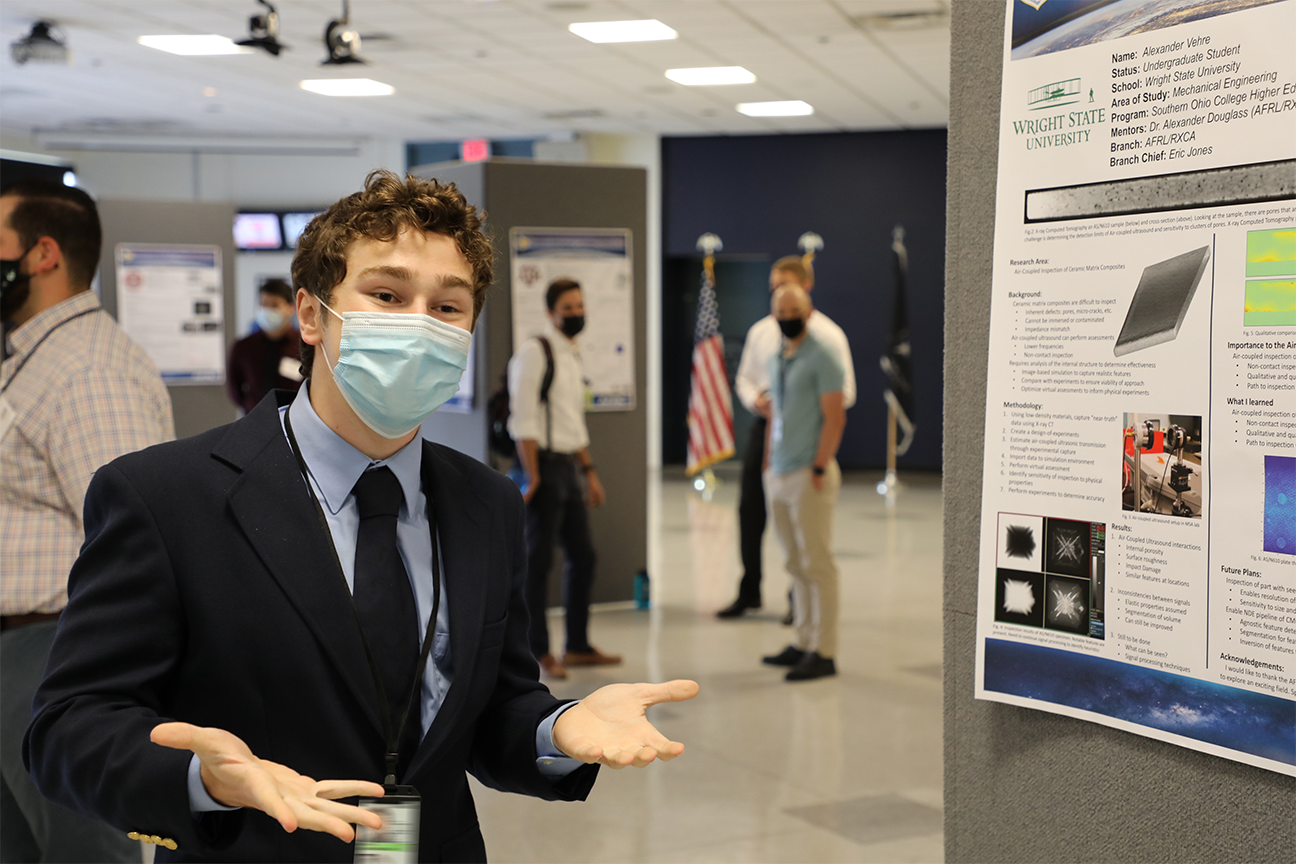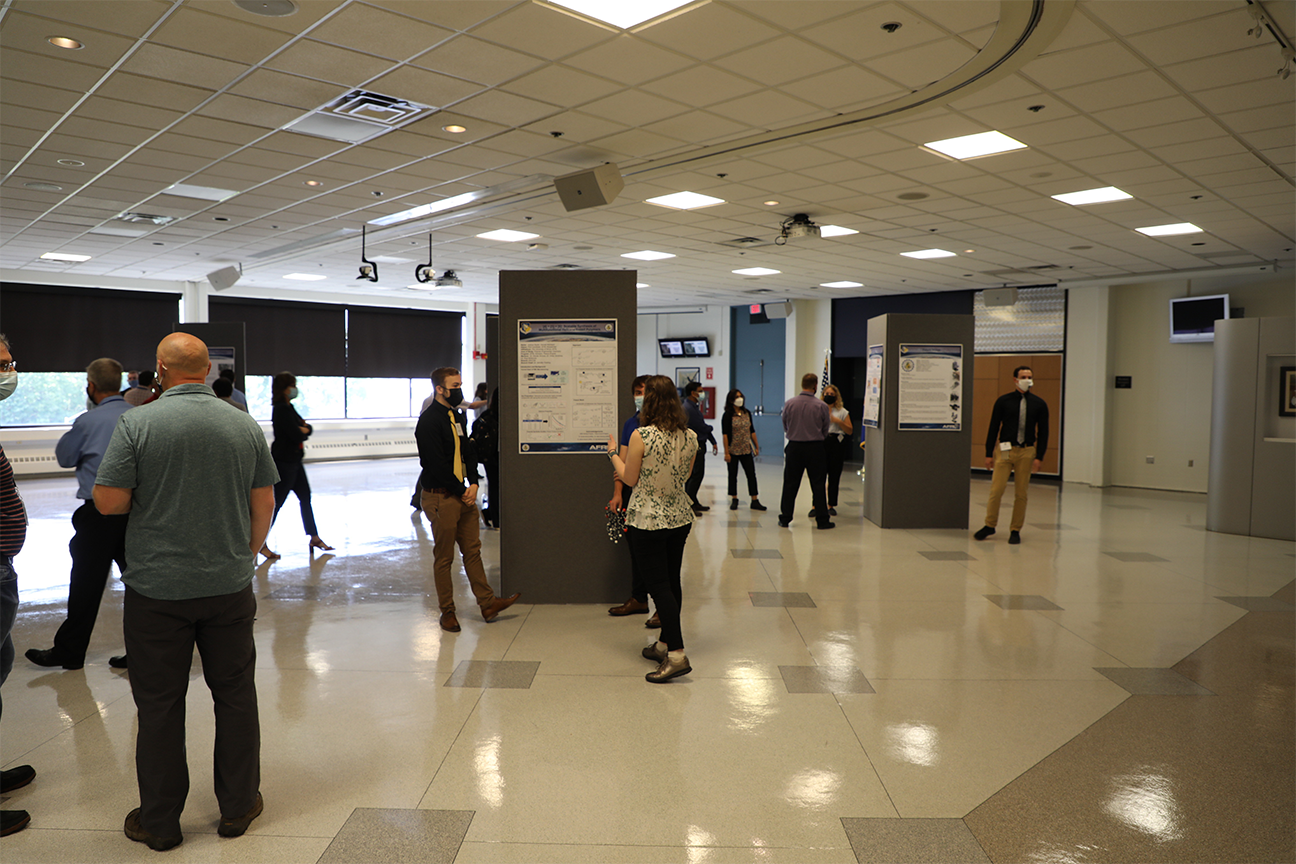AFRL interns showcase their work in annual poster session at Wright-Patterson
WRIGHT-PATTERSON AIR FORCE BASE, Ohio (AFRL) – After canceling 2020’s event because of the COVID-19 pandemic, the Air Force Research Laboratory’s Materials and Manufacturing Directorate’s annual student poster session was back on again for 2021. In previous years, as many as 70 student researchers have participated; however, this year’s event was considerably smaller. Because COVID-19 is still with us, this year’s event was a “hybrid” one to ensure safe social distancing, with 27 students distributed over two in-person sessions, and 11 presenting virtually.
Held on August 3 and 5, the poster session was an opportunity for student interns at AFRL to showcase their work. The students came from several universities around the country and included all education levels, from high school and college undergrads to PhD candidates.
Most of the students returned to their respective schools following the poster session, but some went back to the lab to continue their internships. Some have worked at AFRL for longer than a year; others have been employed for more than one summer internship.
According to event’s organizer, student program manager Asheley Blackford, some of the students are directly supporting their capstones, theses, or dissertations with the research they have been doing at AFRL. The session gives the students experience in creating an effective technical poster and presenting it to an audience of peers and subject matter experts. It also helps them build their professional portfolios.
Dr. Richard Vaia, Chief Scientist for the Materials and Manufacturing Directorate, opened the first of the two in-person sessions, both of which were held on August 5 in AFRL’s “cafetorium,” by thanking the students and their mentors from both academia and AFRL. In reference to the pandemic, Vaia took note of what a challenging year it has been, saying that in spite of that challenge, this year’s internships have been a huge success.
“Getting new ideas, new folks, in collaborating and driving the science,” said Vaia in describing the importance of the interns’ contributions to the laboratory’s research efforts. “You guys are all part of it. It’s not just the science you do, but the engagement you have and the energy you bring that makes the laboratory such a wonderful place to work.”
He went on to remark that the annual poster session was the highlight of the summer.
The interns at the session represented 15 universities from across the nation, including local institutions Wright State and the University of Dayton.
Blackford spoke of the challenges she had to face in not only organizing the poster session, but also in the management of the internship program in 2021. To stay compliant with CDC guidelines, some of the summer internships were “virtual.” That is, the students’ AFRL research was done in campus facilities at their respective universities instead of onsite at Wright-Patterson.
Even when having to work or attend the poster session virtually, however, the students were happy with their experience at AFRL.
For example, when Marco Martinez, a PhD candidate from Texas A&M University, was asked about working at AFRL, his response was typical of the interns taking part in the session. He said that it was an opportunity to engage in research that had real applications. “It’s been really great to be in the lab and see what working in a world-class institution feels like,” he added.
Joseph Beckett, an intern from the University of Dayton, expressed a similar sentiment, saying, “It’s made me a much stronger engineer.”
Blackford closed out the virtual session by saying that she hoped to see everyone in person next year.
Although most would agree that in-person is the preferred work environment in a research lab, the virtual alternative – even for interns – has allowed projects to continue nearly uninterrupted.
“In the pandemic environment,” said Blackford, “we wanted to continue to support the innovative research that our students perform throughout the year and summer. Providing opportunities for students to be able to work remotely, and still maintain that strong interaction and communication with their research mentors, was our top priority.
“Year-round and summer internships are very valuable experiences,” she continued. “The fact we were able to support students remotely and in-person safely during the pandemic shows how we can successfully persevere through even the most challenging times!”

Wright State University student intern Alexander Vehre explains his poster. Vehre is an undergraduate majoring in mechanical engineering. (U.S. Air Force photo/Micah Hung)

The in-person poster sessions meant masks and social distancing because of COVID-19. (U.S. Air Force photo/Micah Hung)
